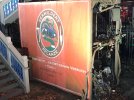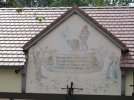Since @Zachary was asking about this in the Mäch Tower thread I put together a small summary of the names in the German area to point out what BGW got right and wrong.
I am not sure where the best place for this would be, so feel free to move it.
Rides: (direction Italy to France)
-Mäch Tower
What a way to start. This name is a mess. Neither word is German and one of them isn't even a real word. "Mach" (as in the mach number representing the ratio of flow velocity past a boundary to the local speed of sound) is spelled with a Metal Umlaut (https://en.wikipedia.org/wiki/Metal_umlaut) for additional German feel.
The original pronunciation (not using the IPA) is like "muh-ch" with a German "ch" that pretty much sounds like clearing your throat. That's usually very hard for Americans to pronounce.
The "ä" would turn it into something more akin to "meh-ch" which is just wrong and solely done for the visual appeal.
"Tower" would be "Turm" in German.
-Verbolten
This is not a real German word either. It's a combination of the German "Verboten" (forbidden) and, what I assume, the English "Bolt" as in the lightning bolt in it's logo.
The pronunciation would be pretty much as you expect it to be.
Notable is that the decorations at the station are incorrect as well. While the ride is clearly supposed to be in the Black Forrest, a region in the south west of Germany, the posters and props in the station are from all over southern Germany and Austria. The ride is also located in the Octoberfest section, which would actually indicate Bavaria in the South East of Germany.
There are several badly translated signs around the ride, most notable a sign that features Yoda's saying: "Do or do not, there is no try" in incorrect German along with some other directly translated terms that are grammatically incorrect in German. I can go into details if anyone is interested. (see attached picture)
-Der Wirbelwind
This one is actually completely correct. It means "The whirlwind".
In Germany these rides are typically known as "Kettenkarussell" (chain carousel) in Germany
-Der Roto Baron
This seems to be a play on words again. Meant is clearly "Der Rote Baron" (The Red Baron, Manfred von Richthofen, a German fighter Pilot in WWI with 80 air combat victories on record) I'm not sure where the "Roto" comes from. I would assume it's based on "Rotor" or "rotation".
-Der Autobahn
They got this one almost correct. "Autobahn" is female though, so it should be "Die Autobahn"
-Kinder Karussel
They got close again here but misspelled it. It's "Kinder Karussell" spelled correctly. (children's carousel)
-Alpengeist
This one is completely correct. Please note the "e-i" in the name. It is usually misspelled by Americans as "Alpengiest".
"e-i" is pronounced as "I" like in "ice" while "i-e" would turn into "ee" as in "meet".
Stores/Landmarks:
-Pretzels and Beer
This is obviously the English spelling of "Bretzels and Bier". Sounds about the same though,
-Das Festhaus
This one is correct and easy to pronounce.
Notable are the German poems written in old German font on the outside of the building. Whoever painted these must have been working off of a low resolution printout of the writing because several of the letters are incorrect. ("w" instead of "m" and such) as a result many words are wrong, but the poem itself is grammatically correct though, so I assume someone actually did some research on that originally.
I don't have a picture of it right now or I would try to translate it. I think I have seen a translation in a thread somewhere here on the forum before though.
-NewKastle
This one is just silly. They Germanfied the name by replacing "c" with "k". A proper German name (if not a good one) would be "Neuschloss".
Based on the ride that used to be in there I would suggest "Wolfsburg"
-Der Markplatz
No complaints here. It's the market place. To pronounce it right you have to spit at the "tz" part.
-Wilkommenhaus
The welcome house. Technically not incorrect, but slightly weird in German.
-German Gifts
I don't remember all the names of the small stores in this area and the official map and website don't list them. If anyone has the names I can comment on them.
Let me know if I am missing anything or if you have additional questions to any of these.
Bis dann, bleibt gesund.
I am not sure where the best place for this would be, so feel free to move it.
Rides: (direction Italy to France)
-Mäch Tower
What a way to start. This name is a mess. Neither word is German and one of them isn't even a real word. "Mach" (as in the mach number representing the ratio of flow velocity past a boundary to the local speed of sound) is spelled with a Metal Umlaut (https://en.wikipedia.org/wiki/Metal_umlaut) for additional German feel.
The original pronunciation (not using the IPA) is like "muh-ch" with a German "ch" that pretty much sounds like clearing your throat. That's usually very hard for Americans to pronounce.
The "ä" would turn it into something more akin to "meh-ch" which is just wrong and solely done for the visual appeal.
"Tower" would be "Turm" in German.
-Verbolten
This is not a real German word either. It's a combination of the German "Verboten" (forbidden) and, what I assume, the English "Bolt" as in the lightning bolt in it's logo.
The pronunciation would be pretty much as you expect it to be.
Notable is that the decorations at the station are incorrect as well. While the ride is clearly supposed to be in the Black Forrest, a region in the south west of Germany, the posters and props in the station are from all over southern Germany and Austria. The ride is also located in the Octoberfest section, which would actually indicate Bavaria in the South East of Germany.
There are several badly translated signs around the ride, most notable a sign that features Yoda's saying: "Do or do not, there is no try" in incorrect German along with some other directly translated terms that are grammatically incorrect in German. I can go into details if anyone is interested. (see attached picture)
-Der Wirbelwind
This one is actually completely correct. It means "The whirlwind".
In Germany these rides are typically known as "Kettenkarussell" (chain carousel) in Germany
-Der Roto Baron
This seems to be a play on words again. Meant is clearly "Der Rote Baron" (The Red Baron, Manfred von Richthofen, a German fighter Pilot in WWI with 80 air combat victories on record) I'm not sure where the "Roto" comes from. I would assume it's based on "Rotor" or "rotation".
-Der Autobahn
They got this one almost correct. "Autobahn" is female though, so it should be "Die Autobahn"
-Kinder Karussel
They got close again here but misspelled it. It's "Kinder Karussell" spelled correctly. (children's carousel)
-Alpengeist
This one is completely correct. Please note the "e-i" in the name. It is usually misspelled by Americans as "Alpengiest".
"e-i" is pronounced as "I" like in "ice" while "i-e" would turn into "ee" as in "meet".
Stores/Landmarks:
-Pretzels and Beer
This is obviously the English spelling of "Bretzels and Bier". Sounds about the same though,
-Das Festhaus
This one is correct and easy to pronounce.
Notable are the German poems written in old German font on the outside of the building. Whoever painted these must have been working off of a low resolution printout of the writing because several of the letters are incorrect. ("w" instead of "m" and such) as a result many words are wrong, but the poem itself is grammatically correct though, so I assume someone actually did some research on that originally.
I don't have a picture of it right now or I would try to translate it. I think I have seen a translation in a thread somewhere here on the forum before though.
-NewKastle
This one is just silly. They Germanfied the name by replacing "c" with "k". A proper German name (if not a good one) would be "Neuschloss".
Based on the ride that used to be in there I would suggest "Wolfsburg"
-Der Markplatz
No complaints here. It's the market place. To pronounce it right you have to spit at the "tz" part.
-Wilkommenhaus
The welcome house. Technically not incorrect, but slightly weird in German.
-German Gifts
I don't remember all the names of the small stores in this area and the official map and website don't list them. If anyone has the names I can comment on them.
Let me know if I am missing anything or if you have additional questions to any of these.
Bis dann, bleibt gesund.
Attachments
Last edited:


